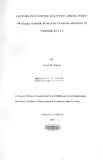| dc.description.abstract | The purpose of this study was to investigate the factors that influence discipline among pupils in public primary schools in Starehe Division, Nairobi Province. 28 headteachers and 60 teachers from the division were randomly selected to participate in the study.
The study reviewed literature related to discipline in schools. These included the understanding of discipline; discipline problems in schools; a general view of factors influencing discipline in schools and Skinner Reinforcement Theory as the theoretical framework for the study.
The study applied a descriptive survey design and data was collected through the use of two sets of questionnaire: Headteachers’ and teachers’ questionnaire. The study established that all the schools experience indiscipline problems. Among the discipline problems experienced in schools include, absenteeism, use of abusive language, sneaking from school, and disrespect for authority. The study also found out that majority of the headteachers used participatory leadership style when dealing with discipline issues at school.
The findings of the study also revealed that among the major home based environmental factors include irresponsible parents, unstable families, immediate home environment and poverty. The study noted that majority of
headteachers used participatory leadership style when dealing with discipline issues in schools. Majority of the schools experience drug and substance abuse among the pupils. Among the key drugs and substances abused include alcohol and miraa. Most of the drugs originate from the homes of the pupils, friends and peers, the neighboring school community and shops and kiosks around the schools.
The study also found out that pupils under the influence of drugs and substances are violent, keep away from school, and are disrespectful to authority. Majority of the respondents noted that drug and substance abuse was quite a threat to discipline in schools. Findings from the study revealed that peer pressure affects discipline in schools. Among the deviant behaviors identified in pupils as a result of peer pressure include poor time management, lack respect for the authority and drug and substance abuse. The findings seem
to suggest that drug and substance abuse is among the key factors that affect
pupils discipline in schools.
Among the measures that should be put in place to minimize indiscipline in schools include strengthening guidance and counseling, full involvement of the parents in pupils’ discipline, and empowering the pupils to make appropriate choices through life skills and health clubs. | en_US |



